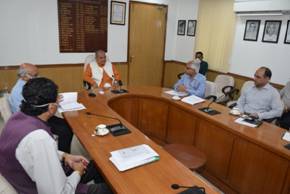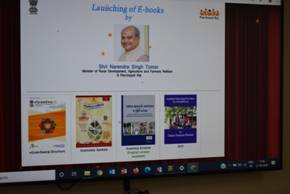Union Minister of Rural Development & Panchayati Raj Shri Narendra Singh Tomar issues guidelines regarding the SVAMITVA scheme, a new initiative of the Ministry of Panchayati Raj
This scheme will help in streamlining planning and revenue collection in rural areas and ensuring clarity on property rights; the scheme will also enable creation of better-quality Gram Panchayat Development Plans engaging Drone Surveying technology
Shri Narendra Singh Tomar also released a Standard Operating Procedure (SOP) regarding e-Gram Swaraj on the occasion
Union Minister of Rural Development & Panchayati Raj Shri Narendra Singh Tomar has said that the government has run several programs to digitally empower panchayats across the country. He was speaking in New Delhi on the occasion of issuing guidelines regarding the SVAMITVA scheme, a new initiative of the Ministry of Panchayati Raj. The Minister said that the aim of this program is to provide rural people with the right to document their residential properties so that they can use their property for economic purposes. The Minister said that this scheme will help in streamlining planning and revenue collection in rural areas and ensuring clarity on property rights. This will also help in resolving property related disputes. The scheme will enable creation of better-quality Gram Panchayat Development Plans (GPDPs), leveraging the maps created under this programme.
SVAMITVA scheme, a collaborative effort of the Ministry of Panchayati Raj, State Panchayati Raj Departments, State Revenue Departments and Survey of India, aims to provide an integrated property validation solution for rural India, engaging the latest Drone Surveying technology, for demarcating the inhabitant (Aabadi) land in rural areas. The program is currently being implemented in six states - Haryana, Karnataka, Madhya Pradesh, Maharashtra, Uttar Pradesh and Uttarakhand. Under this, mapping of rural housing land can be done using the latest survey methods and drones. In Punjab and Rajasthan, 101 Continuously Operating Reference Stations (CORS) will be set up during this year which will set the stage for undertaking actual survey and mapping of inhabited areas of villages next year.


Shri Narendra Singh Tomar also released a Standard Operating Procedure (SOP) regarding e-Gram Swaraj on the occasion. He said that following this procedure, it will be ensured that the funds given to the panchayats are not misused and transparency can be maintained in its use. He said that this process will help in establishing a strong financial system by integrating the Priya Soft and PFMS, the payment portals of the Ministry of Panchayati Raj. The application aims to bring in better transparency and strengthening of the e-Governance in Panchayati Raj Institutions (PRIs) across the country through decentralized planning, progress reporting and work-based accounting. It will also assist in enhancing the credibility of Panchayats which would induce greater devolution of funds to PRIs. Furthermore, e-Gram Swaraj provides a platform for effective monitoring by higher authorities. It will be a single platform for all planning and accounting needs of the Panchayats.
The key focus areas of M/o Panchayati Raj over the last few years has been to track the fund flow of the Central Finance Commission grants and also to ensure timely payments on real-time basis to the service providers in the Panchayats. The Online Payment Module (erstwhile PRIASoft-PFMS Interface (PPI)) is one of its kind whereby Gram Panchayats are carrying out online payments to the vendors and service providers. The main objective of introducing such a module is to have a sound financial management system in the Panchayats leading to their greater credibility and image.
These endeavours are also congruent to that of Digital India Programme which is to transform India into a digitally empowered society and knowledge economy - “Faceless, Paperless, Cashless”.
*****
APS/SG/PK